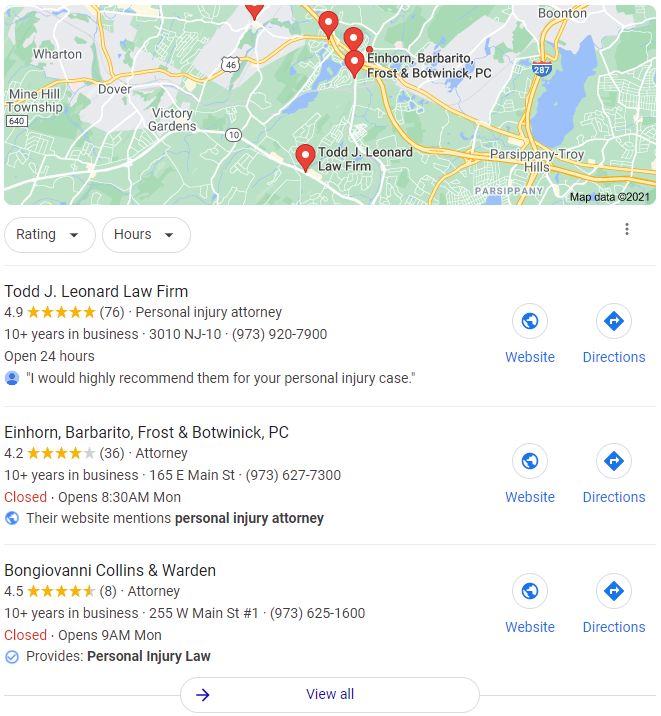How To Use Local Keywords To Rank Your Law Firm Better
BY Kerrie Spencer

LISTEN
An astonishing 76 percent of those searching online for a business using their smartphones typically visit that business within a day. Moreover, approximately 28 percent of those searchers convert to customers or clients. These are powerful numbers.
While local searches often have lower search volumes, it is good to remember that these searches are about intent and obtaining traffic that is ready to convert. Of course, people do not find your law firm just because it is online. Law firms and other businesses need to make it easy for users to find your business in Google and other engines. This means finding and using the right keywords to increase your local rankings. The real question is, then, are you using the right keywords for your law firm?
Researching Local Keywords
Before going on a hunt for keywords, you need to know which queries help people find your law firm.
Optimizing your law firm's site will be easier when you find out what keywords you are ranking for and what keywords potential clients are using. Focus on those important keywords first and then on related ones.
For example, suppose your law firm is ranking well for [car accident attorney Los Angeles]. In that case, you can search for other keywords to expand your reach and use terms such as [Los Angeles car accident attorney] or [best car accident lawyer in Los Angeles]. The trick here is to use other related phrases to reach more potential clients.
What Tools To Use
To find keywords that work for your law firm, try keyword research tools. Some popular tools include SEMrush Keyword Search Tool, Google's Keyword Planner, Ahrefs Keyword Explorer or Keyword Tool.io. Many other tools exist that you can try, but these are good ones to get started with.
When researching, do not limit yourself to only your location. Broaden your search and include well-known nearby places. Widening your search will likely lead to higher volumes of traffic in the end.
Remember always to check out what the competition is doing for local search. You can accomplish that by using the URL of the competitor's contact page and entering it into Google's Keyword Planner. This tactic can give any law firm an advantage over the competition.
Choosing Local Keywords
It is no secret that Google is working toward producing more local search results. What you used to get when searching for something was the same result that everyone across the country got when searching for the same thing.
Now, Google wants to deliver local results first when ranking search results. This means the search query return will favor local results around the searcher's location. This means that local businesses will rank for more competitive and generic searches. This does not mean that competition is easier. It is the opposite. Local companies, law firms included, have less space to compete over in Google search results. This is known as the Local 3-pack.
Law firms that want a spot in the Local 3-pack will need to prioritize their local search engine optimization (SEO).
Choosing the Right Keywords
How do you know what keywords to use? Here are three steps to take in choosing the right keywords.
1. Leverage Industry Keywords
The first thing to do is find commonly used phrases that searchers use to find a law firm like yours. Next, determine what words or phrases are used when searching for an attorney or what words are used to describe the services provided by your law firm. Approach this from a potential client's point of view. Make a list of relevant keywords. The list is the starting point for your main keyword research.
For example, your list may look like this:
• Divorce
• Family law
• Child custody
• Separation agreements
• Prenuptial agreements
2. Use Keywords Modifiers
Next, use modifiers that people use to search online. Modifiers are words that describe a type of service or product, an event, or even a quality. You might consider using something like this:
• Mediation
• Counseling
• Negotiation
So, for law firms specializing in family law, phrases like [negotiating prenuptial agreements] and [mediation in divorce] are excellent examples of longer-tail keywords created with the help of modifier keywords.
3. Research Local Keywords
Next, you want to track down keywords for local SEO for your firm's geographical location. Think about different locations of your law firm's office(s). Consider the locations and areas you serve. Think about the city or cities where your office(s) are located and where your potential clients may come from.
You want to do this because people tend to search for businesses close to them first. For example, target local keywords can include:
• Family law attorney in Los Angeles
• Divorce attorney near Santa Monica
How To Stay Ahead of the Pack
You can count on SEO tactics to constantly change, which means you must keep up with those changes and stay ahead of your competition. Here are some tips for doing just that.
1. Google My Business
One thing that is often overlooked is the importance of having a Google My Business listing. Having a listing means being able to leverage your location-focused SEO strategy. Moreover, the information in Google My Business is used by Google Knowledge Graph and improves local search results.
2. Focus on Local Content
You need to also focus on local content. That means creating long-form, location-based pages, and quality, informative content. You can aim for local promotions, what is trending in the legal niche and industry, and relevant news for the area you are promoting.
3. Citations
Citations are a valuable tool in any SEO campaign. Citations include brand mentions of your law firm and links to your firm from authoritative websites. The links and having your firm mentioned locally adds legitimacy to your firm. Additionally, local directories like Google Listings, the local Chamber of Commerce or Yelp help build a strong local link profile. Mentions of your firm on review sites and high-quality websites send out strong SEO signals.
4. Reviews
Reviews of your services are a vital component in obtaining new business. Always ask for a review from clients your firm has assisted in dealing with legal issues. Positive reviews are a boon, and the negative ones can be handled in a professional, polite and prompt manner to show readers your firm is respectful and handles all reviews.
5. Monitor Results
Watch the results on a daily basis. Track what works. Identify what does not. Tweak when something is not performing well and find out how you can improve what is performing well.
Above all else, keep track of whether the keywords you chose have indeed improved local rankings. You can always select other keywords and try them out to compare which keywords worked the best.
LATEST STORIES




